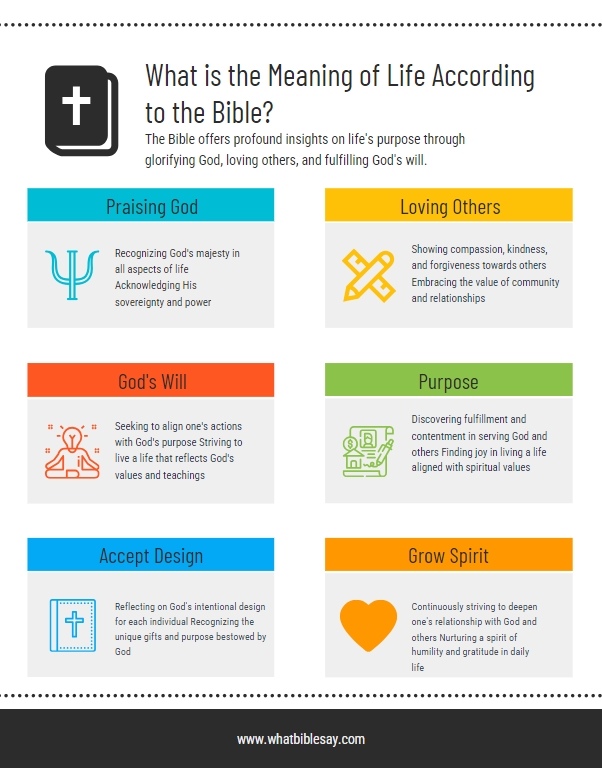The question “What is the meaning of life?” has puzzled philosophers, theologians, and ordinary individuals for centuries. For those who turn to the Bible for guidance, this ancient text offers profound insights into life’s purpose and significance.
This article delves deep into the biblical perspective on life’s meaning, exploring various scriptures, themes, and interpretations to provide a comprehensive understanding of this complex topic.
1. The Biblical Foundation of Life’s Meaning
Creation and Purpose
The Bible begins with the creation story, which sets the stage for understanding life’s meaning from a biblical perspective:
- God created the world and everything in it, including humans
- Humans were made in God’s image (Genesis 1:27)
- God gave humans dominion over the earth and its creatures (Genesis 1:28)
This foundation suggests that human life has inherent value and purpose, as we are designed to reflect God’s nature and steward His creation.
The Fall and Redemption
The biblical narrative continues with:
- The fall of humanity (Genesis 3)
- God’s plan for redemption through Jesus Christ
- The promise of eternal life for believers
This overarching story arc implies that one aspect of life’s meaning is to seek reconciliation with God and participate in His redemptive plan.
2. Key Biblical Themes on Life’s Purpose
1. Glorifying God
One of the primary purposes of life, according to the Bible, is to glorify God. This concept is expressed in various scriptures:
“So whether you eat or drink or whatever you do, do it all for the glory of God.” – 1 Corinthians 10:31 (NIV)
Glorifying God involves:
- Worship and praise
- Obedience to His commands
- Reflecting His character in our lives
2. Loving God and Others
Jesus summarized the greatest commandments:
“Love the Lord your God with all your heart and with all your soul and with all your mind. This is the first and greatest commandment. And the second is like it: Love your neighbor as yourself.” – Matthew 22:37-39 (NIV)
This teaching suggests that a significant part of life’s meaning is found in:
- Developing a loving relationship with God
- Cultivating loving relationships with others
- Serving and caring for our fellow humans
3. Fulfilling God’s Will
The Bible teaches that God has a specific plan for each person’s life:
“For I know the plans I have for you,” declares the Lord, “plans to prosper you and not to harm you, plans to give you hope and a future.” – Jeremiah 29:11 (NIV)
Finding meaning in life involves:
- Discovering God’s will
- Aligning our choices with His plan
- Using our unique gifts and talents to serve His purposes
4. Spiritual Growth and Transformation
The Bible emphasizes the importance of personal growth and transformation:
“Do not conform to the pattern of this world, but be transformed by the renewing of your mind.” – Romans 12:2 (NIV)
This suggests that life’s meaning includes:
- Continual learning and spiritual development
- Character refinement
- Becoming more Christ-like in thoughts and actions
3. Biblical Perspectives on Life’s Challenges
Suffering and Trials
The Bible acknowledges that life includes suffering and trials. It provides insights on finding meaning even in difficult circumstances:
- Trials can develop perseverance and character (James 1:2-4)
- Suffering can lead to spiritual growth (Romans 5:3-5)
- God can use challenges for good (Romans 8:28)
Work and Vocation
The Bible presents work as a meaningful aspect of life:
- Work was part of God’s plan before the fall (Genesis 2:15)
- All work can be done for God’s glory (Colossians 3:23-24)
- Using our skills and talents honors God (1 Peter 4:10-11)
Relationships and Community
The Bible emphasizes the importance of relationships and community in finding life’s meaning:
- God designed humans for relationships (Genesis 2:18)
- The church is described as a body with interconnected parts (1 Corinthians 12:12-27)
- Believers are encouraged to support and encourage one another (Hebrews 10:24-25)
4. Biblical Wisdom Literature on Life’s Meaning
The Bible’s wisdom literature, particularly Ecclesiastes and Proverbs, offers unique perspectives on life’s meaning:
Ecclesiastes: The Futility of Worldly Pursuits
Ecclesiastes explores the meaninglessness of life apart from God:
- Worldly pursuits (wealth, pleasure, knowledge) are ultimately unfulfilling
- The true meaning is found in fearing God and keeping His commandments (Ecclesiastes 12:13)
Proverbs: Practical Wisdom for Meaningful Living
Proverbs provides practical advice for living a meaningful life:
- The importance of wisdom and understanding (Proverbs 3:13-18)
- The value of righteousness and integrity (Proverbs 10:9, 11:3)
- The significance of diligence and hard work (Proverbs 12:11, 13:4)
5. Jesus’ Teachings on Life’s Purpose
Jesus’ teachings provide profound insights into life’s meaning:
The Sermon on the Mount
In the Sermon on the Mount (Matthew 5-7), Jesus outlines principles for meaningful living:
- True happiness (Beatitudes)
- Ethical behavior and attitudes
- Seeking God’s kingdom first
Parables on Life’s Purpose
Jesus used parables to illustrate life’s meaning and purpose:
- The Parable of the Talents (Matthew 25:14-30): Using our gifts for God’s purposes
- The Parable of the Good Samaritan (Luke 10:25-37): Loving and serving others
- The Parable of the Rich Fool (Luke 12:13-21): The futility of materialism
6. Eternal Perspective on Life’s Meaning
The Bible encourages believers to view life from an eternal perspective:
“For our light and momentary troubles are achieving for us an eternal glory that far outweighs them all. So we fix our eyes not on what is seen, but on what is unseen, since what is seen is temporary, but what is unseen is eternal.” – 2 Corinthians 4:17-18 (NIV)
This eternal perspective influences how we understand life’s meaning:
- Current actions have eternal consequences
- Life on earth is preparation for eternity
- Ultimate fulfillment comes in eternal life with God
7. Comparative View: Biblical vs. Secular Perspectives on Life’s Meaning
To better understand the biblical view of life’s meaning, it’s helpful to compare it with common secular perspectives:
| Aspect | Biblical Perspective | Common Secular Perspectives |
|---|---|---|
| Origin of Meaning | God-given purpose | Self-determined or societal constructs |
| Ultimate Goal | Glorifying God, eternal life | Personal happiness, self-fulfillment |
| Source of Morality | God’s character and commands | Human reason, cultural norms |
| View of Suffering | Can have a redemptive purpose | Generally viewed negatively |
| Afterlife | Eternal existence | Usually not addressed |
| Basis of Human Value | Created in God’s image | Often based on utility or capability |
8. Applying Biblical Meaning to Daily Life
Understanding the biblical perspective on life’s meaning has practical implications for daily living:
- Prioritizing spiritual growth and relationship with God
- Serving others and contributing to the community
- Pursuing excellence in work and personal responsibilities
- Cultivating gratitude and contentment
- Maintaining an eternal perspective in decision-making
- Seeking wisdom and understanding through Bible study and prayer
Conclusion
The Bible offers a rich and multifaceted answer to the question “What is the meaning of life?” It presents a purpose that transcends mere existence, rooting life’s significance in a relationship with the Creator. From glorifying God and loving others to personal growth and eternal perspectives, the biblical view of life’s meaning provides a framework for living that many find profoundly fulfilling.
While interpretations may vary among different Christian traditions, the core message remains: life finds its deepest meaning when lived by God’s purposes. For those who embrace this biblical worldview, the journey of discovering and living out this meaning becomes a central part of their life’s story.
As we navigate the complexities of human existence, the Bible continues to offer guidance, comfort, and purpose to those seeking to understand life’s ultimate meaning. Whether in times of joy or sorrow, success or failure, the biblical perspective on life’s meaning provides a steadfast anchor and a guiding light for countless individuals around the world.







